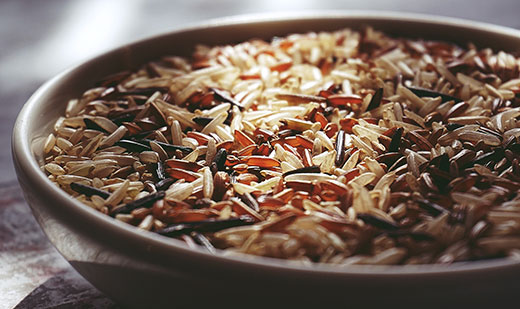
The SNAP-Ed program at Kansas State University is working with state and national partners to increase access to nutrition education and create a long-term plan for maintaining healthy eating habits among Native American tribes in Kansas.
Groups aim to improve Native American access to healthy foods
Kansas Tribal Food Systems encourages ‘health for all’
Jan. 7, 2021
MANHATTAN, Kan. – A coalition of health-conscious tribal members and other groups is laying the foundation for improving nutrition and access to healthy food for Native American tribes in Kansas.
The Kansas Tribal Food Systems project charged forward in 2020 despite the COVID-19 pandemic, holding a series of online lessons aimed to increase access to culturally tailored nutrition education, healthy food choices and a long-term plan for maintaining healthy eating habits.
Tandy Rundus, a regional specialist with the Supplemental Nutrition Assistance Program Education (SNAP-Ed) at Kansas State University, said some of the first-year’s success stories include incorporating recipes for traditional foods like wild rice, bison and salmon.
“Our mission in SNAP-Ed is to empower low-resource audiences to stretch their food dollar to the healthiest foods possible,” Rundus said. “We also look to work on community projects for food access and policy, food systems and environmental changes. So when the opportunity arose to help work already being done…we were humbled to be able to step up and serve.”
The three-year pilot project is a partnership between K-State Research and Extension’s SNAP-Ed program, the American Heart Association and the Sunflower Foundation. The Kansas Tribal Health Summit Planning Committee oversees the project.
So far, their work has helped to provide nutrition education to members of the Iowa Tribe of Kansas and Nebraska; the Kickapoo Tribe in Kansas; Prairie Band Potawatomi Nation; and the Sac & Fox Nation of Missouri in Kansas and Nebraska.
“These are sovereign nations, but our government has not always helped them to be successful at sovereignty, so they pull themselves up to do it and take care of their own,” Rundus said. “We are a partner in helping to encourage ‘health for all,’ which is what SNAP-Ed does nationwide.”
In 2012, with support from the Kansas Department of Health and Environment, the four tribes joined to assess their community health needs, eventually hosting an annual meeting – the Kansas Tribal Health Summit, now in its eighth year.
The Sunflower Foundation provided additional funding in 2015 and eventually supported an eight-month pilot in 2017 to explore the concept of tailoring SNAP-Ed nutrition lessons to tribal populations.
Based on community health conversations, Rundus said the partners found in 2019 that there was strong interest by members of all four tribes for nutrition and cooking classes, leading to the current project.
The program planned in-person lessons through the past year, but like many events, Rundus said it shifted to online formats taught by five SNAP-Ed tribal nutrition assistants, and to work that increased food access by helping to support tribal community gardens.
“Developing trust and relationships with new audiences is something that is easier in face-to-face situations,” Rundus said. “The switch to virtual work and limited personal contact is challenging, but everyone is working to stay connected.”
Rundus said the project adds to work that K-State horticulture professor Charles Barden and extension staff in Brown County have been doing with tribal communities for several years. “What we are doing with SNAP-Ed seeks to continue to be a part of the bigger picture for food access in these areas,” she said.
Janis Simon, a member of the Kickapoo Tribe in Kansas, was hired as the project’s coordinator. Simon, who works for the American Heart Association, helps guide the nutrition assistants and leads the food system planning efforts.
Only a handful of tribal members have participated so far, but Rundus hopes the early work will lead to a more healthy, sustainable native food system.

